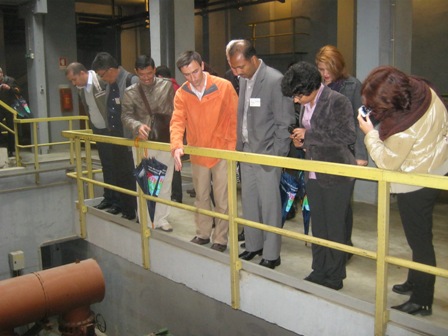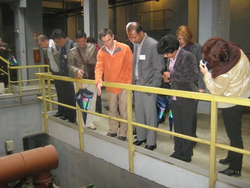Exchange of experiences and learning at the Urban LEDS study tour

As a step towards helping Urban-LEDS cities learn more about innovative urban low-carbon solutions, a study tour was organised by ICLEI – Local Governments for Sustainability from 4-11 April 2014. The study tour showcased highly relevant examples of waste to energy solutions, green buildings and districts as well as low emission transport solutions in three leading European cities participating in the Urban-LEDS project, to facilitate an exchange of experiences and learning between them and the cities coming from the four project countries (Brazil, South Africa, India and Indonesia).
As a part of the Europe study tour, the participants visited Almada, Portugal – the first Portuguese municipality to develop a local Strategy for Climate Change, with a strong integration of low carbon development into the local development strategy; Copenhagen – the European Green Capital 2014 which has set for itself the ambitious target of becoming the first European capital city to be carbon neutral by 2025, addressing economic growth and innovation as two cornerstones; and Hannover – which has set up a unique partnership within its region, involving sixty organizations, and a fund that distributes around €5 million per year for energy efficient refurbishment measures in buildings.
Sanjit Rodrigues, Commissioner of Panaji, India, an Urban-LEDS Satellite city, took part in the tour, together with Emani Kumar, Executive Director, ICLEI South Asia and Soumya Chaturvedula, Regional Manager, ICLEI South Asia. Bio-methanation and eco-mobility were two core areas that stood out as interested domains for Panaji and the rest of the Urban LEDS cities. While in Copenhagen, Mr. Rodrigues witnessed the evaluation of the first stage of The Norrebrogade Project which aims at decreasing car traffic and increasing the number of cyclists and pedestrians by creating wider cycle tracks and pavements. This specific project was of much interest to Panaji as the Indian city is in the process of developing a bike- share programme; and provided the Commissioner with valuable insights into the operations of a bike-sharing program as well as details of related equipment and infrastructure ,which can further guide successful implementation of similar programmes not only in Panaji but possibly in the rest of India as well.
Panaji also intends to set-up a bio-methanation plant to effectively treat and recover energy from biodegradable municipal solid waste. The visit to the anaerobic biological residual waste plant within the integrated solid waste management plant in Hannover was an opportunity to practically observe a similar system in action. Discussions on the operational and management aspects of the plant will benefit the proposed installation in Panaji.
The tour also included participation in the ICLEI Global Town Hall @ Metropolitan Solutions in Hannover, the globally leading fair for urban infrastructure. The ICLEI Global Town Hall provided direct access and understanding of the innovative urban solutions offered by the private sector as well as opening further dialogue, networking and partnership opportunities with such businesses. On 10 April, as part of the Climate Action and Low Carbon Development agenda, a presentation was made on the Solar Cities Masterplan – Preparation and Implementation, for the city of Rajkot, India, by Ms. Soumya Chaturvedula on behalf of the Urban LEDS team at ICLEI South Asia.
The study tour and the Global Town Hall definitely catered to the needs of the Urban LEDS cities and had loads to offer in the form of panel discussions, study visits and much more, thus giving the city representatives and the Urban LEDS team of ICLEI South Asia a basketful of ideas, strategies and guidance to take back home.
For further information on the outcomes of the Global Town Hall, visit:
